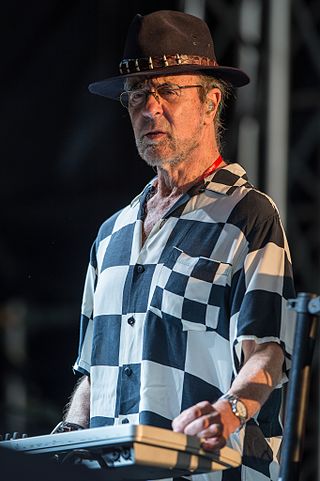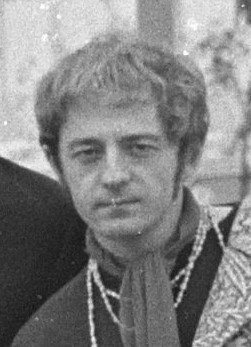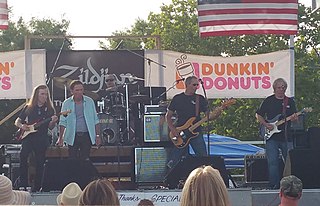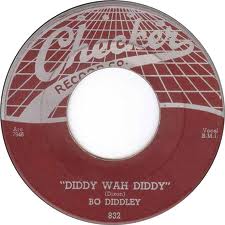Related Research Articles

Manfred Mann were an English rock band formed in London in 1962. They were named after their keyboardist Manfred Mann, who later led the successful 1970s group Manfred Mann's Earth Band. The group had two lead vocalists: Paul Jones from 1962 to 1966 and Mike d'Abo from 1966 to 1969. Other members of various group line-ups were Mike Hugg, Mike Vickers, Dave Richmond, Tom McGuinness, Jack Bruce and Klaus Voormann.

Paul Jones is an English singer, actor, harmonicist, radio personality and television presenter. He first came to prominence as the original lead singer and harmonicist of the rock band Manfred Mann (1962–66) with whom he had several hit records including "Do Wah Diddy Diddy" and "Pretty Flamingo".

Manfred Mann's Earth Band are an English rock band formed by South African musician Manfred Mann. Their hits include covers of Bruce Springsteen's "For You", "Blinded by the Light" and "Spirit in the Night". After forming in 1971 and with a short hiatus in the late 1980s/early 1990s, the Earth Band continues to perform and tour, as of 2024.

"Do Wah Diddy Diddy" is a song written by Jeff Barry and Ellie Greenwich and originally recorded in 1963, as "Do-Wah-Diddy", by the American vocal group the Exciters. Cash Box described the Exciters' version as "a sparkling rocker that bubbles over with coin-catching enthusiasm" and said that the "great lead job is backed by a fabulous instrumental arrangement." It was made internationally famous by the British band Manfred Mann.

Manfred Sepse Lubowitz, known professionally as Manfred Mann, is a South African-born musician, residing in the UK since 1961. He is best known as a founding member of the bands Manfred Mann, Manfred Mann Chapter Three and Manfred Mann's Earth Band.

Mick Rogers is an English rock guitarist, singer and songwriter, chiefly known for his time with Manfred Mann's Earth Band from 1971 to 1975 and again since 1984. Rogers was the original lead vocalist of the band until his departure; after his return, he became a backing and occasional lead vocalist.

Michael John Hugg is a British musician who was a founding member of the 1960s group Manfred Mann, and co-founder of the psychedelic jazz-fusion group, Manfred Mann Chapter Three. He is known for his creativity in his music, and always made jingles for advertisements.

Thomas John Patrick McGuinness is a guitarist, singer and songwriter who played guitar and bass with rock band Manfred Mann, among others, before becoming a record and television producer.

Mighty Garvey! is the fifth and final studio album by Manfred Mann, released on 28 June 1968 by Fontana Records. It was the last recorded by the band after the change of direction and personnel of their 1966 album As Is. It continued a transition away from jazz and blues towards self-composed art-pop. Despite including two UK top 5 hit singles, the album did not chart and the band split up the year after. In the US and Canada, it was released as The Mighty Quinn by Mercury Records.

The Fools are a Massachusetts rock band best known for the party atmosphere of their live performances and tongue-in-cheek original songs, covers and parodies.
This is the discography of English rock band Manfred Mann.
"5-4-3-2-1" is a 1964 song by British band Manfred Mann, written by the group's eponymous keyboardist Manfred Mann along with Mike Hugg and Paul Jones. Released as a single on 10 January 1964, the track peaked at number 5 on the UK Singles Chart, becoming the band's breakthrough single and first commercial hit as the theme tune for the weekly ITV pop music television programme Ready Steady Go!. In an interview with Uncut, Mann said that he regarded Ready Steady Go as being like a rocket, and wrote the song as a countdown to launch it.

"Diddy Wah Diddy" is a song written by Willie Dixon and Ellas McDaniel, known as Bo Diddley, and recorded by the latter in 1956. The song shares only its title with Blind Blake's song "Diddie Wah Diddie" recorded in 1929. Over the years, the Bo Diddley song has been covered by many bands and artists, including the Astronauts, Captain Beefheart and his Magic Band, the Remains, the Twilights, Taj Mahal, the Sonics, the Fabulous Thunderbirds, Ty Segall Band, and the Blues Band among others.

Groovin' with Manfred Mann is an EP by Manfred Mann, released in 1964. The EP is a 7-inch vinyl record and released in mono with the catalogue number His Master's Voice-EMI 7EG 8876.
Brenda Reid is an American singer, who was lead singer of the group The Exciters best known for single "Tell Him". Brenda was married to fellow band member Herb Rooney.
"Come Tomorrow" is a song written by American songwriters Bob Elgin, Dolores Phillips and Frank Augustus for rhythm and blues singer Marie Knight, who issued it as a single in October 1961 through Okeh Records, a release which received good reviews, though failed to chart. The best known version of the song was recorded by British pop band Manfred Mann, who took it to the top-ten in the United Kingdom in 1965.

The Manfred Mann Album is the debut American studio album by Manfred Mann, released in September 1964 on Ascot Records. It contains the hit single "Do Wah Diddy Diddy", as well as covers of well-known R&B hits such as "Smokestack Lightning" by Howlin' Wolf, "I'm Your Hoochie Coochie Man" by Muddy Waters, and "Down the Road Apiece" by Will Bradley. Modern reviews of the album are generally positive and consider The Manfred Mann Album an important piece during the heyday of the British Invasion.

The Five Faces of Manfred Mann is the debut British and second American studio album by Manfred Mann. It was first released in the United Kingdom on 11 September 1964 by His Master's Voice. In late October/early November, the album was released in Canada by Capitol Records. The Canadian track listing was almost the same as the UK version, except it included the hit "Do Wah Diddy Diddy" instead of "I've Got My Mojo Working". The record has been called "one of the great blues-based British invasion albums; it's a hot, rocking record that benefits from some virtuoso playing as well".
Kenneth Cooper Pitt was a British publicist and talent manager, who managed the career of musicians including David Bowie in the late 1960s.

John Edward Burgess was a British record producer and production company executive. In the 1960s, he produced hit records by Adam Faith, Freddie and the Dreamers, Manfred Mann, and many other acts of the early era of the British invasion.
References
- ↑ UNE 11: MANFRED MANN'S NIGGUN Manfred Mann (Manfred Sepse Lubowitz) recorded the smash hit, "Do Wah Diddy Diddy", with his eponymous band on this date in 1964. The South African-born keyboardist formed the first rock band in his country, the Vikings, with Saul Ozynski, a childhood friend, before emigrating to the United Kingdom in 1961 in protest of the apartheid system. “Do Wah Diddy Diddy,” which topped the charts in the U.K, Canada and the U.S., was actually a cover of a song recorded earlier that year by the Exciters (a Black group) and written by the hit songwriting team of Ellie Greenwich and Jeff Barry.